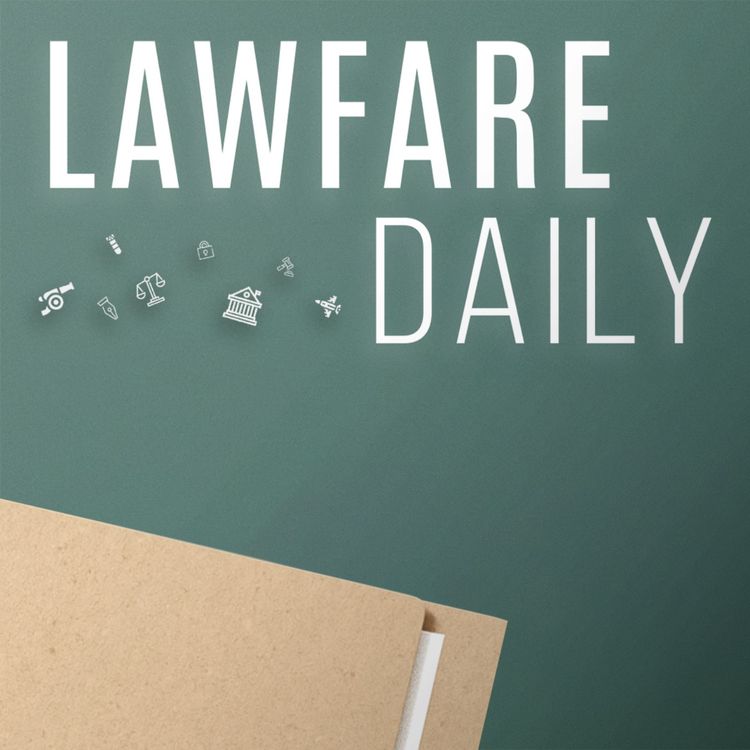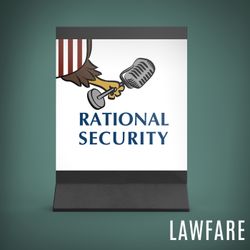Share

The Lawfare Podcast
Lawfare Daily: The Limits of Cyber Subversion, with Lennart Maschmeyer
•
Eugenia Lostri, Lawfare's Fellow in Technology Policy and Law, talks with with Lennart Maschmeyer, Senior Researcher at the Center for Security Studies at ETH Zurich, about his new book, “Subversion: From Covert Operations to Cyber Conflict.” The book explores how subversion works and what its strategic value is, and how technological change alters its reach and quality. They talked about the promise of subversion as an instrument of power, the tradeoffs required for covert operations, and how current doctrine should consider cyber capabilities.
To receive ad-free podcasts, become a Lawfare Material Supporter at www.patreon.com/lawfare. You can also support Lawfare by making a one-time donation at https://givebutter.com/c/trumptrials.
More episodes
View all episodes

Rational Security: “The Story of Three Warrants” Edition
01:22:51|This week, Scott sat down with his Lawfare colleagues Molly Roberts, Michael Feinberg, and Troy Edwards to talk through the week’s big warrant-related national security news, including:“Tulsi Went Down to Georgia, She Was Looking for a Vote to Steal.” This past week, the FBI executed a warrant to search Fulton County’s election center for ballots and equipment related to the 2020 election, with the help of an unlikely senior administration official: Director of National Intelligence Tulsi Gabbard, who was reportedly there in-person at the order of President Trump. Observers are concerned that the search is the beginning of a broader effort to relitigate the 2020 election—especially as Trump calls for Republicans in Congress to “nationalize elections” in advance of the November mid-terms. What do we know about the legal basis for this search? And what does it tell us about what the Trump administration has planned for November?“I Hear the Jury’s Still Out on the Fourth Amendment.” Over the past week, whistleblowers have revealed that ICE has issued a series of internal memos to agents advising that they do not need judicial warrants to detain or search the homes of people suspected of being undocumented immigrants. Instead, ICE has attempted to side-step the regular judicial process by suggesting that agents only need an administrative warrant, a controversial move that will almost certainly be challenged in court. What do we think of ICE’s decision to shift to such a legally dubious policy, and where do we expect it to go from here?“Ex Post Justification.” Last month, the FBI conducted a search on the home of Washington Post reporter Hannah Natanson as part of an investigation into alleged leaks by a Defense Department contractor. During the search, agents seized Natanson’s personal and professional devices, which drew concern from media outlets and civil liberty groups over potential First Amendment and privacy violations. A magistrate judge has now ordered that the FBI cannot access Natanson’s materials at least for now, while some of these issues are litigated. How should federal law enforcement balance the need to conduct leak investigations with press freedoms? And is this case on the right side of the line?In object lessons, sometimes all you can do is cry: Molly is remembering better days for the Washington Post and mourning the fall of a once-great paper. Sometimes all you can do is get lost in the music: Mike is celebrating the still-great Miles Davis with the long-awaited release of The Complete Miles Davis Live at the Plugged Nickel 1965 on vinyl. Sometimes all you can do is laugh: Scott is delighting in his former State Department colleague’s new Substack, Ridiculocracy. And sometimes, all you can do is wear something fabulous: Troy is modeling the new wardrobe must-have for the “Government in Exile.”To receive ad-free podcasts, become a Lawfare Material Supporter at www.patreon.com/lawfare. You can also support Lawfare by making a one-time donation at https://givebutter.com/lawfare-institute.
Lawfare Daily: The U.S. Plan for Venezuelan Oil Revenue
01:03:56|On today's podcast, Executive Editor Natalie Orpett speaks with Lawfare Senior Editor Scott R. Anderson about the recently announced U.S. plan to take possession of Venezuelan oil, sell it on the world market, and hold the revenue from those sales in accounts based in Qatar. Scott and Lawfare Contributing Editor Alex Zerden recently published an article in Lawfare digging into the complexities of the plan. Scott and Natalie talk through them all—what exactly this plan is, how it’s supposed to work, why Qatar is involved, and all the many challenges in play.To receive ad-free podcasts, become a Lawfare Material Supporter at www.patreon.com/lawfare. You can also support Lawfare by making a one-time donation at https://givebutter.com/lawfare-institute.
Lawfare Daily: Unearthing and Reckoning with the Intelligence Excesses of the Cold War
55:46|Lawfare Senior Editor Michael Feinberg sits down with Matthew Guariglia and Brian Hochman to discuss their new book, “The Church Committee ReportRevelations from the Bombshell 1970s Investigation into the National Security State,” in which they chronicle the law enforcement and intelligence community’s Cold War excesses, the Senate committee which uncovered them, and what we can learn about the resulting report in terms of our own era.To receive ad-free podcasts, become a Lawfare Material Supporter at www.patreon.com/lawfare. You can also support Lawfare by making a one-time donation at https://givebutter.com/lawfare-institute.
Lawfare Daily: Misogyny and Violent Extremism with Cynthia Miller-Idriss
51:21|Cynthia Miller-Idriss, a professor at American University, discusses her new book, "Man Up: The New Misogyny & the Rise of Violence Extremism," with Lawfare Foreign Policy Editor Daniel Byman. She explains how different forms of misogyny shape lead to political and social violence, why most scholarship and media accounts usually ignore the role of gender, and what individuals can do to fight back.To receive ad-free podcasts, become a Lawfare Material Supporter at www.patreon.com/lawfare. You can also support Lawfare by making a one-time donation at https://givebutter.com/lawfare-institute.
Lawfare Daily: The Trials of the Trump Administration, Jan. 30
01:28:11|In a live conversation on YouTube, Lawfare Senior Editor Eric Columbus sat down with Lawfare Senior Editors Anna Bower, Roger Parloff, and Molly Roberts to discuss the FBI search of the election center in Fulton County, the arrest of protestors in Minnesota, including Don Lemon, a decision out of the 9th Circuit regarding temporary protected status for Venezuelans, and more.You can find information on legal challenges to Trump administration actions here. And check out Lawfare’s new homepage on the litigation, new Bluesky account, and new WITOAD merch.To receive ad-free podcasts, become a Lawfare Material Supporter at www.patreon.com/lawfare. You can also support Lawfare by making a one-time donation at https://givebutter.com/lawfare-institute.
Lawfare Archive: Discussing President Trump’s First Batch of Executive Orders
57:28|From January 27, 2025: In a live conversation on January 23, Lawfare Editor-in-Chief Benjamin Wittes spoke to Lawfare Senior Editors Scott R. Anderson, Anna Bower, Quinta Jurecic, and Alan Rozenshtein and assistant law professor at Pace University Amelia Wilson about the first batch of executive orders by President Trump in his second term, including suspending enforcement of the TikTok ban, the use of the military at the border, the birthright citizenship order, and the legal challenges some of these orders are facing.To receive ad-free podcasts, become a Lawfare Material Supporter at www.patreon.com/lawfare. You can also support Lawfare by making a one-time donation at https://givebutter.com/lawfare-institute.
Lawfare Archive: Judge Cannon Dismisses Classified Documents Case Against Trump
58:26|From July 16, 2024: On July 15, Judge Cannon granted former President Trump’s motion to dismiss the indictment brought by Special Counsel Jack Smith for the alleged mishandling of classified documents. She found that Smith was appointed as a special counsel in violation of the Appointments Clause of the Constitution.In a live podcast recording, Lawfare Editor-in-Chief Benjamin Wittes talked to Lawfare Executive Editor Natalie Orpett, Legal Fellow and Courts Correspondent Anna Bower, Senior Editors Alan Rozenshtein and Quinta Jurecic, and Columbia Law professor Michel Paradis about Judge Cannon's decision, what Special Counsel Jack Smith may do next, how the Eleventh Circuit may rule on an appeal, how Justice Thomas’s immunity concurrence plays a role, and more.To receive ad-free podcasts, become a Lawfare Material Supporter at www.patreon.com/lawfare. You can also support Lawfare by making a one-time donation at https://givebutter.com/lawfare-institute.
Lawfare Daily: The Thousands of Lawsuits Challenging Pres. Trump’s Mandatory Alien Detention Policy
38:44|Kyle Cheney, senior legal affairs reporter for Politico, speaks to Lawfare Senior Editor Roger Parloff about the thousands of habeas corpus cases he has pored through challenging a Trump administration policy requiring mandatory detention for most detained aliens.They discuss how judges have ruled on these cases, the degree to which those rulings do or don’t correlate with political expectations, the appellate prospects for such cases, and why they haven’t been resolved by class action.More reading on this topic:"Hundreds of judges reject Trump’s mandatory detention policy, with no end in sight," by Kyle Cheney, Politico (January 5, 2026)"Judges, inundated with immigration cases, don’t mince words on ICE tactics," by Kyle Cheney, Politico (January 26, 2026)Kyle's thread on Minnesota cases on XTo receive ad-free podcasts, become a Lawfare Material Supporter at www.patreon.com/lawfare. You can also support Lawfare by making a one-time donation at https://givebutter.com/lawfare-institute.
Rational Security: The “Pawing at Scott” Edition
01:13:12|This week, Scott sat down with his Lawfare colleagues Alan Rozenshtein, Eric Columbus, and Molly Roberts for a deep dive into two of the week’s big national security news stories:“Slipping Down the Slope.” Last week’s killing of 37-year-old ICU nurse Alex Pretti by Border Patrol agents in Minneapolis, Minnesota, has triggered what increasingly appears to be a national backlash against the Trump administration’s immigration policies and ICE’s violent tactics. Republicans and Democrats alike have been increasingly public in their criticism of the administration’s actions—and, in particular, DHS Secretary Kristi Noem—while state officials have begun exploring more legal avenues for pushing back against federal officials. The Trump administration, meanwhile, may be shifting tack, as it has replaced Border Patrol commander-at-large Greg Bovino with immigration czar Tom Homan on the ground in Minneapolis and adopted a more conciliatory tone. Is this a real turning point for the Trump administration’s flagship policy? Or more of a feint?“Now We’re Just Waiting on Artificial Strength, Dexterity, Wisdom, and Charisma.” Last week, the artificial intelligence company Anthropic released what it’s calling a “constitution” for its premier AI model, Claude. The constitution seeks to instill a moral framework, value system, and even a personality in the AI model, taking an unprecedented step in both private AI governance and AI personhood. How does Claude’s constitution factor into broader discussions about AI development and regulating how models should interact with users?In object lessons, Eric sticks to classic Rational Security orthodoxy by recommending an actual, physical object: his wife’s beloved migraine-slaying device, The Tingler. Alan flagrantly violates the show’s informal norms with a repeat recommendation—season 2 of The Night Manager (plus some unsolicited fawning over Tom Hiddleston). Scott, desperate for warmth, throws the rulebook into the fire with a double object lesson: 1) Metro’s Fire Snake to satisfy your basic human need for fire, and 2) long underwear to satisfy your base-layer needs. And Molly restores order with a hat that truly captures how we’re all feeling: America is in trouble, and we’re tired.To receive ad-free podcasts, become a Lawfare Material Supporter at www.patreon.com/lawfare. You can also support Lawfare by making a one-time donation at https://givebutter.com/lawfare-institute.